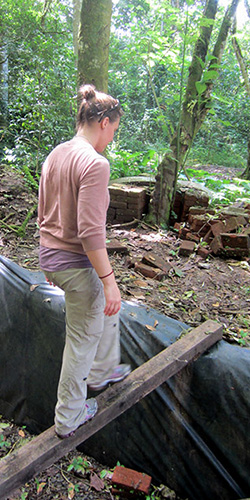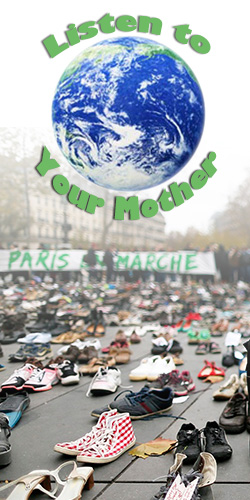Index - February, March, 2016 |
|
| Vermont Women Making a Difference Abroad |
| by Sarah Galbraith |

Carrie McLaughlin walks around a water source that Engineers Without Borders along with the NGO CII-ASDENIC were attempting to develop near Venecia, a coffee-farming community in Nicaragua.
|
Vermont, despite its beauty, can at times be isolating. The rural setting and spotty access to high-speed Internet and cell phones help to insulate the Green Mountain State’s residents from the rush and buzz of the outside world; it’s a bubble many of us seek and enjoy.
But some Vermonters, like the women featured here, have sought to apply their skills and experience to work and volunteer in far-off places. In all cases, they have made countless lives better and have brought back important lessons for their own lives and communities here in Vermont.
Bringing Clean Water to Nicaragua
Carrie McLaughlin, an electrical engineer, first became involved with Engineers Without Borders (EWB, www.ewb-usa.org) while living in San Francisco. She volunteered to be part of a team that traveled to Haiti to do energy work, and “it opened my eyes,” she says of seeing another part of the world where people lived in extreme poverty but were happy and surrounded by a beautiful landscape. “The people in Haiti were wonderful. There is no way that Haiti got more from me than I got from it,” she says of her volunteer experience.
When she returned to Vermont to work as an engineer in the coffee-roasting plant at Green Mountain Coffee (GMC) in Waterbury, she sought to maintain her connection to EWB, so she helped form a Vermont chapter for which she serves as president. “I wanted to do more and help other engineers to have a similar experience to mine in Haiti,” she says. McLaughlin reached out to her connections at GMC and sought input from Rick Peyser, a longtime GMC employee (now retired) who worked on supply-chain outreach in coffee communities like Nicaragua.
Continue Reading...
|
|
Bringing the World to Vermont:
Brattleboro Women's Film Festival & Global Roots Film Program |
| by Cynthia Close |

|
Vermont has a well-established film culture born in its fertile soil, nurtured by its progressive politics, and grown through community support. Two impressive examples of the long-term survival of film and expanded vision of film programs in the state are the Brattleboro Women’s Film Festival, celebrating its 25th anniversary this March, and the newer Global Roots Program, founded in 2013 by the Vermont International Film Foundation.
Brattleboro Women’s Film Festival: History of the Festival
Back in 1991, the Women’s Crisis Center (now known as the Women’s Freedom Center) in Brattleboro launched the first festival, screening films made by women filmmakers about issues that most concern women. The center was originally founded during the great wave of feminism that swept the country in the late 1960s and early ’70s. The center’s philosophy, then and now, states: “We believe the roots of violence against women lie in the patriarchal structure of societies—social systems constructed in ways that maintain male power and privilege over women and condone violence as a method of control... Our goal is to end men’s violence against women and the inequitable institution of patriarchy that gives rise to multiple forms and expressions of abuse.”
The work of the center takes a multipronged approach. It has a 24/7 hotline for women to help in the moment of extreme crisis, as well as providing housing and long-term support for women and children who are seeking a safe haven from violence and abuse.
Continue Reading...
|
|
Lisa Alther: American Cultural Humorist |
| by Elayne Clift |

Author Lisa Alther at her home in Vermont. photo: Sara Bostwick
|
Lisa Alther has one foot in Vermont, where she has lived for over four decades, and the other in Tennessee, where she was born. If she had a third foot it would be in New York City, the third place where she now divides her time. Each venue has played a role in her literary life.
Born in Kingsport, Tennessee, in 1944, Alther graduated from Wellesley College before working for Atheneum Publishers in New York. Later she moved to Hinesburg, Vermont, where she raised her daughter. She has also spent much time in London and Paris during the course of her writing life, producing six novels as well as a substantial body of other work.
Four of her books have been New York Times bestsellers and many have been translated into over a dozen foreign languages. According to her website (www.lisaalther.com), her writer’s mission is to “portray the human reality behind cultural stereotypes, especially as they relate to women.” Often she does this with humor, prompting several critics to say she has “comic genius.”
Alther wrote her first short story at age 16 for her high school newspaper. She continued writing in college where she worked on the campus newspaper, and it was then she decided on a writing career. While working in New York, she started sending short stories to magazines. Her fiction was repeatedly rejected, but some nonfiction articles sold.
After her daughter was born, she began trying her hand at writing novels while the baby napped. “Eventually, I started going to a boarding house in Montreal called the American Sunshine Rooms for a week every couple of months, where I did nothing but write, eat, and sleep,” she recalls. “When I got back home, I typed and revised while my daughter dumped wooden blocks in my lap.”
Continue Reading...
|
|
| After the Climate Talks: What’s Next for the Global Climate Movement? |
| by K.C. Whiteley |
On November 13, 2015, a series of coordinated terrorist attacks claimed by the Islamic State killed 130, mostly young people in Paris, with hundreds more injured, leaving Paris and all of France under a state of emergency.
In the aftermath of these horrific killings, some thought the UN Climate Change Conference or COP 21 (Conference of the Parties) would be cancelled as the French government clamped down on its borders, deployed 3,000 additional police in Paris, and extended a state of emergency, which, among other things, banned public demonstrations (but not large gatherings like sporting events).
In Paris, French foreign minister, Laurent Fabius, called off a huge march organized by international climate advocates Avaaz and 350.org that had been scheduled to mark the start of the talks. Public actions organized months in advance were cancelled as organizations worked to quickly contrive new and creative ways to make their presence felt at the talks. Paris organizers held all participants to a pledge of nonviolence and lined up acts of creative symbolism. Thousands of “marching shoes” were placed at the Place de la République, intended to show the commitment of the French people on climate change.
Pairs of shoes were laid out by the statue of Marianne, where, only weeks before, bouquets, candles, and messages commemorated the victims of the November terrorist attacks. Among them were sneakers from UN secretary general Ban Ki-moon and a pair of black shoes sent by Pope Francis.
Continue Reading...
|

|
|
A Postfeminist Era? Not in Jordan! |

Elayne Clift (right) poses with Abeer Alshroof, a master’s degree student at the University of Jordan who is working to help orphans and underprivileged families secure basic necessities.
photo: Marta Bellingreri |
| by Elayne Clift |
They sit in a semicircle, fully attentive. Some wear hijab, looking like Botticelli-painted nuns. Others reveal their hair, perhaps a headscarf wrapped loosely around their necks. Some are married and mothers; some are single. One is a foreign student earning her PhD studying art as social commentary among Middle Eastern women. A few are struggling to find their way to feminism in a Middle East context, while others celebrate their arrival into the world of like-minded women. They are studying for master’s degrees at the University of Jordan in Amman, where I was invited to speak last November about the history of the women’s movement in America and beyond.
The young women gazing at me remind me of something I have known since I became engaged in, and committed to, feminism: the world is full of feminists, fledging or fully developed. They reside in every continent and community and likely have been there for a long time, although we may not have called them that in their day. They remind me, too, of women I met in Nairobi at the final UN Decade for Women conference in 1985, some who came knowing they would be severely punished when they returned home, and yet they came, 14,000 strong.
They also remind me of women I met in Beijing 10 years later at the Fourth World Conference on Women, some of whom came with male chaperones, and yet they came, 40,000 strong. They remind me of women who came to give testimony, to offer analysis through the lens of gender, to speak truth to power, to inspire and advise others.
Continue Reading...
|
|
Women, the Economy, and Dunne’s Platform |

Matt Dunne with his daughter Cora speaks to a supporter at his announcement kick-off event. photo: Dave Gibson |
| by Nathalie Gagnon-Joseph |
Waking up early, getting the three kids ready for school, squeezing in a quick workout before meeting his campaign team about the daily schedule, video conferencing as part of his job for Google from his office in White River Junction, having a discussion about job creation over coffee with a potential supporter or community leader, e-mailing and editing position pieces during rides to and from where he needs to go, and hosting a fundraiser before heading home around 11 p.m.
That’s a day in the life of Matt Dunne, who is running for governor of Vermont for a second time. He made the announcement on October 5, 2015, in Barre.
“If Matt the candidate has half the energy that Governor Dunne will bring to the table, then he will definitely get the job done,” said Fauna Hurley, the Dunne campaign finance director.
Dunne lives with his wife, Sarah Stewart Taylor, and their three children, Judson, Abe, and Cora, in Hartland, where he was born and raised. After graduating from Brown University with a degree in public policy, he was elected to serve in the legislature at the age of 22 and later represented Windsor County in the Senate. As the director of AmeriCorps*VISTA, which empowers people to get out of poverty, he managed 6,000 people.
Continue Reading...
|





